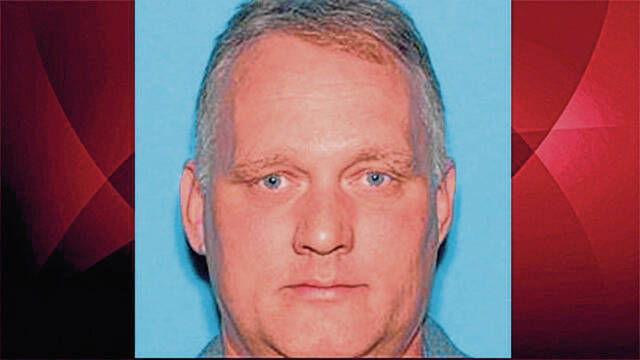Robert Bowers recounted to the forensic psychologist interviewing him in explicit, sometimes graphic detail the steps he took — not only in choosing his target for attack, but in how he methodically moved through the Tree of Life synagogue as he carried out the attack.
How he wanted to create the maximum amount of carnage to send a message to other Jews.
How he felt conflicted in having to shoot at law enforcement officers because they were assisting his perceived enemy.
How he chose to delete his computer hard drives and his Gab.com social media account prior to committing his crimes.
How he was pleased that he killed 11 people but disappointed he didn’t kill more.
All of those things, the defense expert testified Thursday, point toward Bowers being severely mentally ill.
“I think he was blatantly psychotic,” Richard Rogers testified.
But government prosecutors believe those actions by Bowers exemplify the intent and planning that went into the crime and make him eligible to be put to death.
Rogers, a professor at the University of North Texas for 33 years, testified for nearly seven hours on Thursday during the fourth day of the eligibility phase in the trial of Bowers, 50, of Baldwin.
On June 16, a jury found Bowers guilty of all 63 federal counts against him, including that he killed 11 people who were members of the Tree of Life-Or L’Simcha, Dor Hadash and New Light congregations on Oct. 27, 2018.
They included Rose Mallinger, 97; Bernice Simon, 84, and her husband, Sylvan Simon, 86; brothers David Rosenthal, 54, and Cecil Rosenthal, 59; Dan Stein, 71; Irving Younger, 69; Dr. Jerry Rabinowitz, 66; Joyce Fienberg, 75; Melvin Wax, 87; and Richard Gottfried, 65.
The government is seeking the death penalty. In this phase of the trial, the prosecution must prove that Bowers is eligible for capital punishment. To do so, the government must prove intent and at least one of four aggravating factors.
The defense, which admitted from the outset that Bowers committed the crimes he was accused of, is attempting to convince the jury that he should not be eligible for the death penalty because schizophrenia and brain dysfunction mean he could not form the requisite intent.
Rogers did not go so far as to say that in his testimony, but he did say that he believes Bowers was severely mentally ill at the time of the attack.
Rogers told the jury that he spent more than 18 hours with Bowers at Butler County Prison over four days last fall. Based on that evaluation, as well as the completion of nine separate psychological assessments, he found that Bowers has schizophrenia and, at the time of the synagogue attack, was severely mentally ill.
Even four years after the crime, as he interviewed the defendant, Rogers described Bowers as almost gleeful in some of his descriptions — often smiling, sometimes laughing and pointing out things that he thought were funny or ironic from the day of the attack.
For example, Bowers told Rogers he remembered feeling bad about parking in a handicapped space at the synagogue that day because it was illegal, and then laughing because killing people was immensely more illegal, the witness said.
Bowers described himself to Rogers as calm and focused that day.
He was proud of his actions on what he referred to as “Attack Day,” and thought he would be venerated for them — maybe with a parade or medals.
“He felt he had done something in his mind that might be seen as heroic,” Rogers said.
Among the evaluations he conducted on the defendant, Rogers said several were designed to show if Bowers was faking his psychotic symptoms.
The tests showed he was not, he testified.
What they did show was that, in 2018, Bowers was experiencing “extreme persecutory and nihilistic delusions that the Jews are responsible for invaders entering the United States and destroying white persons,” Rogers testified.
In spring 2018, he continued, Bowers displayed “clearly manifested symptoms of schizophrenia.”
“This became his life,” Rogers said. “The thinking, the planning, the preparation. The act became his life.”
Rogers said that during his interview with him, Bowers became excited when talking about his feelings about Jews.
“He was doing this not just for himself. He was doing it for the white race — to stop race mixing, to stop the widespread killing of white children,” Rogers said. “It was a call to action, a call that this needs to be done.
“One of his goals was to get people to follow his example.”
Rogers measured the severity of Bowers’ delusions as “extreme,” in which he could “hurt himself or hurt others.”
But on cross-examination, U.S. Attorney Eric Olshan repeatedly asked Rogers if he recognized that many of the hateful things Bowers said about Jews were popular tropes online and beliefs shared by an entire population of white supremacists. It is common on sites like Gab.com for people to claim that Jews run the government and media and that they are trying to replace the white population — called white genocide, Olshan said.
So, he asked Rogers, are all those other people delusional too?
Rogers disagreed.
“We’re talking about the severity of the beliefs and the actions taken for the beliefs,” he answered.
Throughout his more than three hours of cross-examination, Olshan focused on Rogers’ report in which he described Bowers’ mental illness. The prosecutor’s focus was not on what the report included. Instead, he wanted to know what Rogers left out.
Time and again, Olshan quoted from Rogers’ 36-pages of handwritten notes, in which the forensic psychologist wrote down what Bowers shared with him during their interview.
Details about his plans and ideas for carrying out the attack. Even his sense of humor.
And time and again, the prosecutor asked, “None of those are in your report?”
“No,” Rogers answered repeatedly.
Bowers told Rogers he covered the extra ammunition in his car with a blanket to make sure no one saw it.
“That detail is not in your report?” Olshan asked.
“No, it is not,” Rogers answered.
The morning of the attack, Bowers drove past the synagogue and went to the nearby Jewish Community Center of Greater Pittsburgh, contemplating it as a target. However, he chose to return to the synagogue to carry out his attack.
“That’s not in your report?” Olshan said.
“It is not,” Rogers said.
He admitted that Bowers was a person capable of identifying goals and following through on them.
Although he did not delve too deeply into specifics, Rogers spoke briefly about the defendant’s past mental health history, which included a reported suicide attempt at age 10.
Then, when he was 13, Bowers then was hospitalized continuously for nine months, getting treatment at three different facilities.
He was taken to McKeesport Hospital on Sept. 23, 1985. He was initially described as fearful, withdrawn and acting out. He needed to be restrained, records showed.
Doctors there diagnosed Bowers with depression, chronic and adolescent adjustment reaction. They said there had been a “homicide attempt” — a reference to an incident in which he sprayed aerosol on his mother and tried to light it on fire, Rogers testified.
Bowers was transferred straight to Southwood Psychiatric Hospital in Upper St. Clair on Oct. 10, 1985, Rogers said.
Doctors there said Bowers experienced a “marked regression and extreme isolation.” He also acted “antagonistically” to Southwood staff. When he was discharged Nov. 21, 1985, records showed he had atypical depression and was responding well to antidepressant medications.
He then was admitted to the Bradley Center in Robinson the next day.
He remained there until June 5, 1986. His records showed that he was admitted for aggression and “physical, verbal and fire setting,” and he was presented as quiet, withdrawn, fearful and anxious.
He responded to treatment there, although according to the records, Rogers said, “He absolutely did not want to go home.”
Near the end of the court day, the prosecution called a witness of its own out of order because of a scheduling issue.
Mike Williams, a corrections officer at Butler County Prison, said that he has worked on the Restrictive Housing Unit where Bowers is being held since his arrival there more than 4½ years ago.
Williams described Bowers as “very neat and orderly,” and said he understands directions and follows the rules. He has good hygiene, sleeps regularly and communicates with him clearly, including staying on topic and asking appropriate follow-up questions.
Bowers has never had an infraction or write-up and is very routine in his daily habits.
He watches a lot of news programs on television.
Williams said he has never known Bowers to take any medication or have a mental health diagnosis, or have epilepsy.
He’s also never known him to be delusional.
Williams testified that the red uniforms Butler County Prison uses can sometimes leave stains on the walls from where inmates lean against them. The dye in the uniforms also leaches out and colors the identification bands worn by those incarcerated.
On Wednesday, a doctor testified that Bowers described a delusion to him in which the dye from the jail uniform leached into his skin, and then went from his skin into the identification bracelet and back into his pen.











